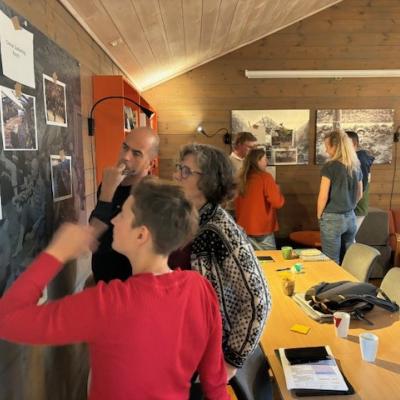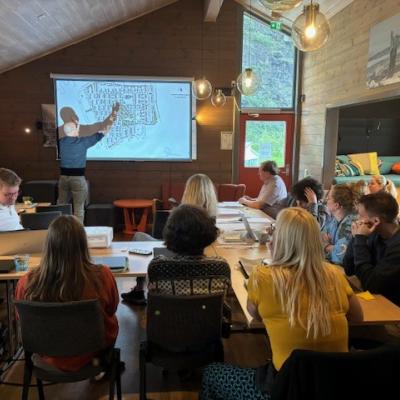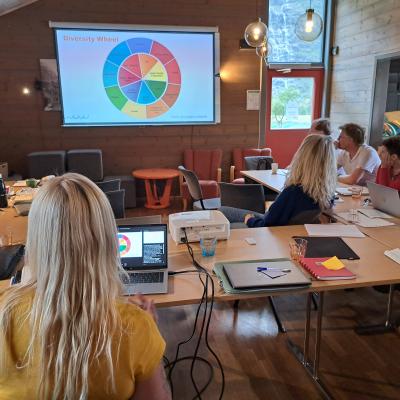The Summer Academy kicked off with a dynamic series of workshops that focused on practical, results-driven initiatives in social housing and mobility. Participants dived into cutting-edge research, feasibility studies, and actionable solutions designed to bridge the gap between housing development and sustainable mobility.
Social Housing Meets Mobility Innovation
The morning opened with a presentation by Ann from Stad Mechelen, unveiling the results of a Needs Analysis conducted in collaboration with Woonland and Autodelen.net. This comprehensive survey explored mobility habits within social housing units. Key findings highlighted that elderly residents and those with disabilities heavily rely on public transport, emphasizing the need for accessible bus stops. The survey also shed light on when shared mobility could offer a practical alternative to private transport.
For cities and housing developers aiming to replicate this study, the team emphasized the importance of conducting face-to-face surveys, which proved more insightful than online methods. Ann also highlighted the value of collaborating with local universities, a partnership that enriched their research.
Tackling High-Cost Parking with Smart Mobility
Next up, Woonland Mechelen brought a pressing challenge to the table: the steep cost of underground parking spaces. Their new social housing project requires 64 parking spots for 105 housing units, but pollution in the groundwater has pushed the cost of these underground spaces to €4.6 million—a staggering 28% of the total project cost.
Woonland is exploring creative solutions inspired by international examples like the MobiHouse in Helsingborg. To make shared mobility a more viable alternative to expensive parking, they posed six critical questions to the consortium. These ranged from site selection for MobiHubs to integrating social functions and lowering parking standards. One key takeaway: shared mobility options, such as carsharing, could significantly reduce the need for parking spaces, supported by existing research from Autodelen.net.
The consortium responded with practical insights, advocating for shared mobility to be spread throughout the entire housing complex rather than centralized in one hub. They also suggested adding social spaces to increase community engagement and enhance safety around shared mobility points. Clear signage, well-lit areas, and test-out sessions were deemed essential to encourage adoption.
By utilizing tenant surveys and the documented underuse of parking spaces, Woonland Mechelen now has compelling evidence to negotiate lower parking requirements with the city.
Communication in Housing Developments
In the second workshop, Cornelia Cordes from Bremen led a session on the importance of Diversity, Intersectionality, Privilege, and Mobility. This thought-provoking exercise demonstrated how individual backgrounds—whether related to race, gender, or class—affect access to shared mobility. Some powerful visuals, such as the Diversity Wheel and Privilege and Power Wheel, provided new perspectives on how inclusive mobility planning can be.
Esther De Reys from Autodelen.net followed with a hands-on workshop on crafting a communication timeline for housing developments. Her session focused on key moments in the customer journey, urging developers to strategically introduce shared mobility options at the right time, whether people are moving into social housing or purchasing a home.
Governance and Policy Solutions for Architects
The day wrapped up with an in-depth look at how policy and governance shape mobility planning, particularly in architectural projects. Rebecca Karbaumer from Bremen shared insights from Bremen's architect training program, showing how developers can implement successful mobility management to make their projects greener and more cost-effective. A key takeaway was the financial impracticality of underground parking, which can never fully recoup its costs. Instead, mobility plans focusing on shared solutions and reducing car dependency offer a smarter way forward.
The first day of the Summer Academy was packed with insightful discussions and forward-thinking solutions. From the feasibility of MobiHubs to the intricacies of diverse mobility needs, participants left with a deeper understanding of how social housing and shared mobility can coexist in harmony. By addressing both financial constraints and social inclusion, the workshops charted a course towards more sustainable, community-focused urban development.
Planning for housing developers: Timing is everything
The second day of the Summer Academy dived deeper into the crucial topic of integrating shared mobility into housing developments, with Working Group 2 taking the lead. Overseen by Housing Europe, the group tackled the journey of housing developers in embedding shared mobility solutions into their projects. Divided into smaller groups, participants explored the nuances of both social and private housing developments.
The key takeaway? Timing is everything. Shared mobility must be introduced early, ideally from the planning phase, yet in most cases, it only surfaces when the building permits are requested. This too-late approach hampers optimal integration, as residents often rely on private cars before shared mobility options are even available. The group advocated for embedding shared mobility considerations into land-use planning and ensuring it’s ready when residents move in—just like playgrounds.
For social housing, shared mobility solutions need to be tailored to meet specific needs and integrated throughout the entire construction process. An overarching consensus emerged: shared mobility shouldn't be an afterthought but a vital part of housing projects from the start.
Some recurring questions sparked engaging discussions:
- Why can playgrounds be ready at launch, but not shared mobility options?
- How do we create flexible parking regulations that reduce the need for costly underground spaces?
One eye-opener came from Helsingborg, where residents were forced to rely on private cars due to delayed shared mobility implementation. This showcased the importance of providing shared options from day one.
The session closed with 13 common principles for developers, and lively debate ensued over the affordability of shared mobility for social housing tenants. While some argued it’s often too costly, others pointed out that subsidies and creative solutions can make it accessible.
Knowledge is power
After an engaging morning, the spotlight shifted to Working Group 4: Monitoring and Evaluation. The focus here was on crafting solid research questions that bridge the gap between academic theory and practical application. Led by Lund University and Gustave Eiffel, this session laid the groundwork for upcoming research projects. Participants explored how robust data collection and precise research questions could fuel better decision-making in future shared mobility projects.
Wrapping up or getting started?
The Summer Academy wrapped up with a forward-looking session that introduced participants to cutting-edge tools and frameworks in shared mobility. Kolumbus and Stavanger presented the innovative Shared Mobility Calculator, a tool designed by Beta Mobility to help developers measure the potential for shared mobility in housing projects. This calculator highlights the maximum potential for multimodal transport in new developments—crucially, though, the tool is not a prediction but an optimistic estimation based on ideal conditions.
Participants were reminded that while the calculator offers a glimpse of what’s possible, accurate data collection is key to ensuring reliable projections. The more localized and detailed the data, the better the outcomes.
One of the most stimulating discussions revolved around how developers and public transport operators can collaborate to change the environment. It's clear that successful shared mobility requires alignment between public and private players, investment, and a clear strategy to maximize resources and reduce car dependency.
As the Academy concluded, the participants were left armed with practical solutions, strategic frameworks, and a shared mission to transform mobility in housing developments across Europe. The future of shared mobility is now, and the next step lies in action.
Written by: Steffie De Moor



